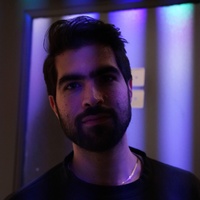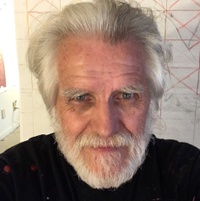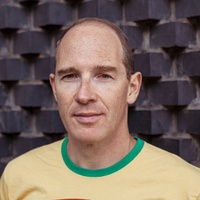As told to Kailee McGee, 1755 words.
Tags: Film, Process, Beginnings, Production, Mental health.
Writer and director Doron Max Hagay on creative compromise and figuring yourself out
Writer and director Doron Max Hagay discusses what led him to making films, why therapy and healthy self-acceptance can be a boon to your creative process, and why some amount of compromise is inherent in almost all creative work.When did you know you were a filmmaker?
I guess I knew when I started making films, but I always had a really strong interest in movies, and I always kind of inexplicably wanted to be a director. Maybe the reason why I wanted to be a director was because I grew up in Los Angeles, and being a director seemed like a job a person could have, and I was always watching movies with friends so movies were the art form that mattered the most to me. It could also be because my home life was chaotic and directing is so much about control. I think I had this real need and a real use for creating things that I could have influence over.
But from a very early age I was “directing.” In the first grade I “directed” a puppet show. The 7th and 8th graders put on a performance of Joseph and the Amazing Technicolor Dreamcoat that absolutely blew my mind, and I got a copy of the script and had my dad xerox it at his work. The puppets were made with computer paper that we folded “hotdog style” and then folded over the top for where the face would be. I could really talk about this forever. The puppet show never happened but it was such a moment. I remember one boy from the other first grade class coming up to me with a box full of puppet palm trees and pyramids that he had made at home with his mom.
Where do you find your inspiration?
I like reading interviews. I like reading interviews with painters. Philip Guston: Collected Writings, Lectures, and Conversations is a book I highly recommend. I go to the museum regularly. I’m lucky that MoMA is so close by and it’s truly the best museum in the world. Anarchy of the Imagination is another amazing book of interviews with Rainer Werner Fassbinder. Jutta Koether makes paintings that I love looking at and learning about.
In your day to day is there separation between work and regular life?
I would say yes, more so now than ever—now that I have a job. Before I had a job directing, there was less of a boundary, and it was very hard to keep things separate. Now that I have this job that requires so much of my energy when I’m at work, when I’m not at work, I’m simply not working.
But before when I was doing part-time work like babysitting, and assisting, I was never not working. I was always kind of on the lookout, or working on my own stuff while on the job. I guess that’s true when I’m not working on the show—when the show’s on break—I kind of enter that space again, where I’m like, okay, now everything is weirdly like work and I need to be thinking of ideas and projects for myself.
You’re currently directing digital shorts for SNL. What is that creative process like?
I’m assigned a sketch every Wednesday night. Everyone on my team gathers in my office and we talk over the idea with the writers and/or performers. Everyone asks a bunch of questions for like 30 minutes and then everyone’s off to do their jobs. I work very closely with my DP throughout the week.
The great but tricky thing about SNL is that there are basically unlimited resources, except you just don’t have any time. That’s the challenge. It’s actually a good thing because having anything you want can be really suffocating—especially for me, as someone who in the past—when someone would approach me with an idea, I would just ultimately begin to think in terms of compromise. That’s how I was built up as a director.
Compromise is part of the creative expression in some way. On Saturday Night Live that’s true too. You absolutely have to compromise in some ways, in different ways. It’s different because the people I work with on the show are so good at their jobs they can make anything happen, and they want to make everybody’s wishes come true, but there’s no time so you have to deal with that.
How much are you on your phone?
I’m on my phone a lot. Like everybody else in the world right now, I have a really toxic relationship with my phone. And, I’m not even someone who uses social media that much. I want to read this book called How to Break up with Your Phone.
How do you decide if something’s worth posting on social media?
Sometimes I’m absolutely horrified by what people post. And then I’m like, don’t delude yourself about what social media is. There is nothing noble or sexy or cool about social media. So… just post what you want, and don’t try to create an ethics of posting.
Do you have a morning routine?
No, not really. I wanted to avoid saying these things at all costs, but: I do try to meditate every day; I do try to do some form of yoga/stretching at home every day; and I do try to read a little bit every day—and, I try to do all of this before leaving the house for the day. Some days I don’t do any of it, and some days I do all of it. I feel like it would be so nice to have more of a routine.
What kind of people do you surround yourself with creatively?
I surround myself with… who do I surround myself with? I don’t know. Most of my friends are artists, comedians, performers, painters, and photographers. Also lots of young, centered dentists.
Do you actually ever hang out with dentists?
I don’t have any dentists in my life personally or professionally actually, which sucks. Yeah, I’m trying to think of the least creative person I hang out with. There is the kernel of a Quibi game show in there.
What are your dreams for 2020?
I feel like I’m in a place where I’ve thankfully realized certain patterns of thinking, and certain behavioral patterns, and I’d like to continue growing and doing that kind of work on myself. I created this narrative about needing to transform myself in order to feel happy—in order to be the person who I want to be, in order to be the director and the thing I have dreamed of being—and I’m realizing that I’m actually okay, and I don’t need to change anything about myself in order to be who I am.
Tell me a little bit about your background and childhood.
One of the defining things about my childhood was that my mom died when I was one, and I never talked about it with anybody. My dad was sort of silent growing up, and he did not emotionally nurture or create an environment at all for my brother and me to process the loss of a parent. It took me six years of deep psychoanalytic therapy in my mid-20s to finally begin processing all of this. The realization that this brutal thing that happened affected me. It seems so obvious, but back then I was like, “My mom died, so what? What’s the big deal?!”
Processing my mom’s death changed my life. I grew up in a house where nothing mattered. I feel like a big part of my obsession with filmmaking might stem from this sort of—there’s something like a time capsule about film. You capture things, and they exist, and they’re there to look at it, and see, and you can talk about it.
I started to connect dots, and I actually made this connection in therapy that three films, which I made with Blair Beeken and Katy Fullan: Rodney, She Keeps Me Young, and Company—there’s not a single man on camera. And Company is a film about male absence. I guess I feel kind of traumatized by men because it was tough to be around someone like my dad, so I make films about women, and I make films with women. I want to be around women. It’s a weird thing that I’m still processing. It’s complicated to say that as a gay man my identification points are with women, but I feel more connected to women.
That’s why people need to make short films—because at least for me, you don’t know yet what you’re working with, what your substance is. You can live in your head, but as a director, I need more than just words to continue my process. So, I feel like my short films have the function of showing me what I’m made of, and they allow me to create some sort of frame of reference as I continue.
What piece of advice would you give your 16 year old self?
Don’t be scared. I was so scared. I was closeted. I was so terrified for years and years and years of being rejected and hated. Also, absolutely go to therapy.
Doron Max Hagay Recommends:
Birds of Passage - my favorite film of last year. A film about the origins of the drug trade in Columbia told through an indigenous point of view. The subject matter is not typical of a film I’d love but, my god, such a thoroughly enjoyable viewing experience and unexpected in so many ways.
Picture by Lillian Ross - A producer at SNL gave this to me as an Xmas gift. It’s such a romantic portrait of the director John Huston and Hollywood, but also the power struggle of movie-making.
Maps to the Stars - If you haven’t seen this film by David Cronenberg, see it! It’s maybe my favorite film of the decade. Some of the best dialogue. So funny. Feels like it will be a perfect capsule of the ’10s.
Superstar: The Karen Carpenter Story by Todd Haynes- Saw this Todd Haynes masterpiece in college and it’s what convinced me that I definitely wanted to be a director. Watch this and then read the essay “Grainy Days and Mondays” by Lucas Hilderbrand.
Seiobo There Below by László Krasznahorkai - This book is really beautiful and also a little puzzling because the author writes in pages-long sentences. Each chapter is a short story about an artist or a craft. The story “The Preservation of a Buddha” really settled my nerves.




